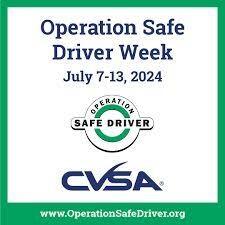School's Out
Get ready for summer and make sure your truck is in top condition! Check out this week's Safety Bulletin and sign up to receive our weekly safety newsletters.
In this issue:
- Heat and your Truck
- Drug Enforcement Agency (DEA) Issues Proposed Rule to Reschedule Marijuana to Schedule III Controlled Substance
- What CDL drivers should know about using CBD products
- CVSA’s Operation Safe Driver Week: July 7-13
- CVSA’s Brake Safety Week Scheduled for Aug. 25-31
- Registration Open for the 2024 Idealease/NPTC Safety Seminars!
Summer is Here! Remember, Safety First!
As summer approaches, many of us are eager to spend more time outdoors. With school out, children are participating in various outdoor activities, and adults are also taking advantage of the longer daylight hours. It's important for all of us to stay alert and prioritize safety. Here are some important safety tips for drivers:
- Exercise extra caution when driving through school zones during the last week of school, as children may be preoccupied and forgetful of the rules of the road.
- Be aware that children may be arriving or leaving school at different times during the last few days of the school year.
- Remember that playground speed limits are always in effect. Be especially careful when driving around playgrounds and parks, as small children are less predictable and harder to see than adults.
- Watch for signs of children playing nearby, such as a hockey net or ball in the road or on the sidewalk. Always be vigilant and anticipate the unexpected.
- Take the time to check around your vehicle for small children or pets before backing up. Always be mindful of potential hazards.
- While making deliveries, be on the lookout for children on bikes, skateboards, or walking in parking lots, shopping centers, and crossing streets, especially during school hours.
Heat and Your Truck
To ensure the safe operation of commercial motor vehicles (CMVs), it is essential for drivers to consider the impact of heat on the vehicle's crucial components: the engine coolant system and the tires.
Engine Coolant
Extended-life coolant (ELC) was introduced about eight years ago by original equipment manufacturers (OEM) in the trucking industry. Engine operating temperatures have since increased by 10 to 15 degrees due to EPA regulations, contributing to approximately 50% of engine failures. Low coolant levels can lead to potential damage to emission components such as the exhaust gas recirculation (EGR), while ELC offers a 12 to 13 percent improvement in the engine's heat transfer rate.
Diesel Exhaust Fluid (DEF)
To prevent sensor damage in high-temperature conditions, it is advisable to keep the DEF tank as full as possible.
Tires
In the summer, ambient and road temperatures can significantly rise, potentially exceeding 100°F and almost 200°F, respectively. Underinflated tires are at a higher risk of failure in extreme temperatures, illustrating the severe impact of heat on tires. When hot summer temperatures, underinflated tires, heavy loads, and high speeds are combined, it creates a recipe for tire failures.
Tips to Minimize Summer Tire Issues:
- Increase the frequency of tire pressure checks during the summer.
- Measure tire pressures when the tires are cold, as operational temperatures can lead to a false reading.
- Conduct thorough inspections for punctures and damage during pre- and post-trip inspections and stops.
- Promptly report any tire conditions requiring attention to your maintenance provider.
DEA Issues Proposed Rule to Reschedule Marijuana to Schedule III Controlled Substance
The U.S. Drug Enforcement Administration (DEA) has proposed a rule to move marijuana from the most restrictive category of controlled substances to a less restrictive category. This change is based on the belief that marijuana has medical uses and may not be as harmful or addictive as previously thought. However, even if this change goes through, marijuana will still be regulated, and using it could still lead to legal trouble.
For drivers with a commercial driver's license (CDL), it's important to know that even if marijuana is reclassified, using it is still not allowed by the Department of Transportation. This means that CDL drivers are still subject to drug testing and cannot use marijuana, even if its legal status changes.
In addition, it's important for CDL drivers to be aware that using CBD products can also lead to positive drug tests. Since 2020, a significant number of drug test violations reported among CDL drivers have been due to marijuana use. So, it's crucial for CDL drivers to understand the rules and regulations related to drug use, including the use of CBD products.
- USDOT Testing Requirements: The USDOT requires testing for marijuana, not CBD.
- Misleading CBD Product Labels: Many CBD products may contain higher levels of tetrahydrocannabinol (THC) than what is stated on the product label.
- Drug and Alcohol Testing Regulation: The USDOT’s Drug and Alcohol Testing Regulation (49 CFR Part 40) does not authorize the use of Schedule I drugs, including marijuana, for any reason.
- CBD and Positive Drug Tests: CBD use is not a legitimate medical explanation for a laboratory-confirmed positive marijuana result. Medical Review Officers will verify a drug test as positive at the appropriate cutoffs, even if an employee claims they only used a CBD product.
- Caution Advised: Since the use of CBD products could lead to a positive drug test result, USDOT-regulated CDL drivers should exercise caution when considering whether to use CBD products.
Read the USDOT’s “CBD Notice” in full on the USDOT website.

Registration Now Open for the 2024 Idealease/NPTC Safety Seminars!
Driving Safety in 2024
Idealease and the National Private Truck Council (NPTC) are excited to announce the opening of registration for the 2024 Safety Seminars. These one-day seminars will focus on crucial topics such as safety data analysis, basic safety and compliance, regulation changes, and CSA.
Who Can Attend: These seminars are open to all Idealease customers, potential customers, and NPTC members, and are provided at no charge.
Seminar Highlights:
- Gain insights into safety practices and compliance regulations.
- Learn about the latest advancements in safety technology.
- Understand CSA (Compliance, Safety, Accountability) and its impact on your operations.
Spring 2024
- 4/10/24: Sun Prairie, WI
- 4/18/24: Frankfort, KY
- 5/9/24: Tampa, FL
- 5/21/24: Portland, OR
- 5/23/24: Santa Rosa, CA
Fall 2024
- 10/1/24: Eugene, OR
- 10/3/24: San Leandro, CA
- 10/9/24: Baltimore, MD
- 10/17/24: Nashville, TN
10/28/24: Stockton, CA
Note: If you don't see a seminar in your area listed yet, don't worry. Registration availability will be updated weekly as venues are secured. Keep an eye on this bulletin for the latest updates. To register for an upcoming seminar in 2024, click on the following link: Safety Seminar Registration. Don't miss out on this opportunity to enhance your safety knowledge and practices in 2024. Register today!

CVSA’s Operation Safe Driver Week Is Scheduled for July 7-13
The Commercial Vehicle Safety Alliance (CVSA) has announced July 7-13 as the dates for this year’s Operation Safe Driver Week, an initiative aimed at promoting safe driving through enforcement and outreach efforts. Law enforcement personnel in Canada, Mexico, and the U.S. will focus on identifying and addressing unsafe driving behaviors among commercial motor vehicle and passenger vehicle drivers, including speeding, distracted driving, following too closely, and impaired driving.
The primary focus of this year’s Operation Safe Driver Week is reckless, careless, or dangerous driving. Reckless driving refers to operating a vehicle with willful or wanton disregard for the safety of persons or property, while careless or dangerous driving involves operating a vehicle without due care and attention or reasonable consideration for other on the road. Enforcement actions during this week may include warnings or citations for drivers engaging in such behaviors.
*The Idealease Safety Bulletin is provided for Idealease locations and their customers and is not to be construed as a complete or exhaustive source of compliance or safety information. The Idealease Safety Bulletin is advisory in nature and does not warrant, guarantee, or otherwise certify compliance with laws, regulations, requirements, or guidelines of any local, state, or Federal agency and/or governing body, or industry standards.
